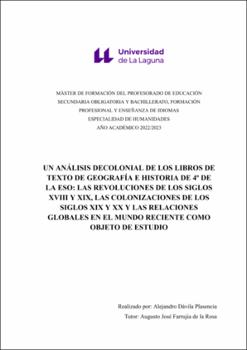Un análisis decolonial de los libros de texto de Geografía e Historia de 4º de la ESO: Las revoluciones de los siglos XVIII y XIX, las colonizaciones de los siglos XIX y XX y las relaciones globales en el mundo reciente como objeto de estudio.
Fecha
2023Resumen
Los libros de texto siguen siendo una de las herramientas principales en la labor
educativa a día de hoy. Uno de los problemas que sigue presentando trabajar con libros
de texto como herramienta central para dirigir el proceso de enseñanza - aprendizaje es
que el discurso principal aportado por el libro sigue estando vinculado a la visión
europea y colonialista como eje central de los contenidos a impartir. Esto provoca un
análisis parcial de los contenidos trabajados en el libro, que ignora el enfoque de los
grupos dominados, lo que no permite al alumnado forjar una visión crítica sobre la
historia. En este trabajo de fin de máster se propone un análisis de una parte del temario
de dos de estos libros, correspondientes a las editoriales Anaya y Santillana, vinculada a
la colonización, referente al nivel de 4° de ESO, en el marco de la LOMCE, abarcando
las unidades de las revoluciones de los siglos XVIII y XIX, el periodo de colonización
entre los siglos XIX y XX y las relaciones y desigualdades globales en el mundo
reciente, así como el análisis de actividades y recursos proporcionados por el libro,
desde el punto de vista cualitativo y cuantitativo, de tal forma que se pueda concluir el
grado de fragmentación en los contenidos, el grado de autonomía que se le otorga a los
alumnos/as y el grado de expresión crítica que el alumnado desarrolla, lo que llevará a
establecer el nivel de enfoque colonial y decolonial presente en los libros de texto
analizados. Textbooks continue to be one of the main tools in educational work today. One of the
problems that working with textbooks continues to present as a central tool to direct the
teaching-learning process is that the main discourse provided by the book continues to
be linked to the European and colonialist vision as the central axis of the content to be
taught. This causes a partial analysis of the contents worked on in the book, which
ignores the focus of the dominated groups, which does not allow the students to forge a
critical vision of history. In this master's thesis, an analysis of a part of the agenda of
two of these books is proposed, corresponding to the Anaya and Santillana publishing
houses, linked to colonization, referring to the 4th ESO level, within the framework of
the LOMCE, covering the units of the revolutions of the 18th and 19th centuries and the
period of colonization between the 19th and 20th centuries and the global relations and
inequalities in the recent world, as well as the analysis of activities and resources
provided by the book, from the qualitative and quantitative point of view, in such a way
that it is possible to conclude the degree of fragmentation in the contents, the degree of
autonomy that is granted to the students and the degree of critical expression that the
students develop, which will lead to establishing the level of colonial and decolonial
approach present in the textbooks analyzed.





